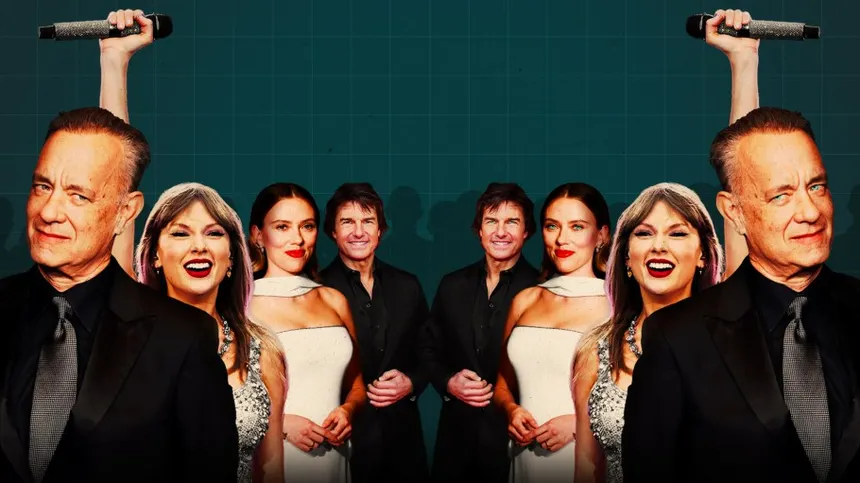Artificial Intelligence (AI) is revolutionizing many industries, but its latest use in advertisements has sparked a fierce debate. Celebrities and fans alike are outraged over AI-generated deep fake ads featuring famous personalities without their permission. As technology advances, ethical and legal concerns about digital impersonation are growing rapidly.
What Are AI Deepfakes?
Deepfakes are AI-generated videos or images that manipulate existing footage to create hyper-realistic imitations of real people. By using advanced machine learning algorithms, AI can replicate facial expressions, voice tones, and movements to make it appear as though a person is saying or doing things they never actually did. While deep fake technology has been used in entertainment and satire, its use in advertisements without consent has become a major ethical issue.

The Growing Use of AI Deepfakes in Advertising
Many brands and marketers have begun experimenting with AI deep fakes to promote products. Some of the ways deepfake technology is being used in advertisements include:
- Reviving Late Celebrities: AI has been used to bring back legendary figures for commercials, such as Marilyn Monroe or Bruce Lee.
- Simulating Endorsements: Some brands create deep fake versions of celebrities to seemingly endorse their products, even when the real person has never agreed to it.
- Multilingual Ads: Deep fake technology allows companies to make an actor or celebrity appear to speak multiple languages fluently without dubbing.
- Reducing Production Costs: AI deep fakes eliminate the need for costly reshoots, travel, or actor fees, making advertisements more budget-friendly for brands.
Celebrity Backlash and Legal Concerns
Many celebrities are furious about their likeness being used without consent. Some of the biggest issues raised by stars include:
- Unauthorized Endorsements: Some deepfake ads make it seem as if a celebrity is promoting a product they never signed off on.
- Misinformation: AI-generated content can spread false narratives, misleading audiences and damaging reputations.
- Loss of Creative Control: Actors and influencers argue that deepfakes strip them of their artistic and brand identity.
- Privacy Violations: Celebrities claim that the use of their image and voice without permission is an invasion of privacy.
Some major incidents include:
- Tom Cruise Deepfake Videos: AI-generated videos of actor Tom Cruise went viral, making people question how easily deepfakes can deceive audiences.
- Fake Scarlett Johansson Ad: The actress condemned a deepfake ad that misused her likeness without approval.
- Bruce Willis AI Controversy: There were rumors that AI deepfakes were used in a commercial starring Bruce Willis without his real involvement, leading to legal confusion.

Legal Actions and Industry Response
To combat the growing misuse of AI deepfakes, celebrities and lawmakers are calling for stricter regulations. Some steps being taken include:
- Stronger Copyright Laws: Many governments are working on new legal frameworks to ensure AI-generated content respects intellectual property rights.
- Lawsuits Against AI Companies: Several celebrities have filed lawsuits against companies using their likeness in AI-generated ads without permission.
- Industry Guidelines: Some advertising agencies and AI developers are proposing ethical guidelines to ensure responsible use of deepfake technology.
- AI Watermarking Technology: Experts suggest adding invisible digital markers to AI-generated content to differentiate deepfakes from real footage.
The Ethical Dilemma: Innovation vs. Exploitation
The controversy over AI deepfake ads highlights a larger ethical debate:
- Pros of AI Deepfake Ads
- Reduces production costs and increases creative possibilities.
- Helps brands create multilingual marketing campaigns effortlessly.
- Can be used for nostalgia-based marketing by reviving historical figures.
- Cons of AI Deepfake Ads
- Raises concerns about identity theft and loss of personal rights.
- Can be exploited for false advertising and misinformation.
- Risks damaging the reputation and trust of celebrities and consumers.

The Future of AI in Advertising
As AI technology continues to advance, the advertising industry must find a balance between innovation and ethics. Some possible future developments include:
- Mandatory Consent Agreements: Celebrities may sign digital agreements allowing or restricting the use of their AI-generated likeness.
- AI Regulation Laws: Governments worldwide may introduce stricter laws to prevent AI exploitation in marketing.
- Consumer Awareness Campaigns: Educating the public on how to spot AI-generated content may help reduce the spread of misinformation.
- Ethical AI Advertising Models: Some companies may adopt fair-use AI strategies that benefit both celebrities and brands.
Conclusion
AI deepfake technology is changing the landscape of advertising, but it comes with significant challenges. The unauthorized use of celebrity images and voices raises serious ethical and legal concerns, sparking widespread controversy. As regulations catch up with technology, the advertising industry must ensure that AI is used responsibly to protect both celebrities and consumers. The debate over AI deepfakes is far from over, and its impact on the future of entertainment and marketing remains to be seen.
Do Follow USA Glory For More Updates.






